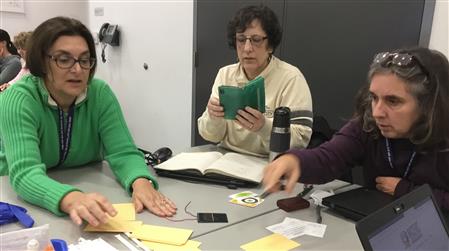
Micro:bits, decoders, and solar panels ... oh my! Led by subject matter experts from the National Integrated Cyber Education Research Center, Western Massachusetts CSTA teachers explored STEAM Fundamentals, a phenomenon-based, hands-on curriculum designed to engage elementary students in real-world applications of technology.
Around one dozen educators tried a variety of hands-on challenges from the curriculum, including:
- Digital Footprint: can you guess who someone is based only on five pieces of information written on an index card?
- Ciphers: can you decode the secrete message?
- Optical Illusions: can you make two images look like one?
- Solar Panels: can you design a stand that will allow a solar panel to capture as much light as possible?
- Sending Information: can you code the micro:bit to send a message to someone across the room?
NICERC's STEM EDA and STEAM Fundamentals courses engage students in science, technology, engineering, and mathematics, while making connections to humanities content and cyber contexts. By following the Engineering Design Process, students develop 21st-century skills like problem-solving, critical thinking, leadership, creativity, and communication. The modules include opportunities to integrate technology through micro:bit coding projects (using block-based languages). To learn more about NICERC's library of free, modular curricula visit https://nicerc.org/curricula/.